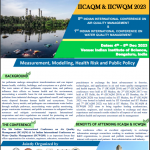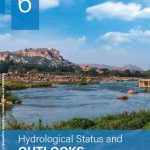Understanding hydrologic cycling from a thermodynamic Earth system perspective
Name of the Speaker: Dr. Axel Kleidon
Title of the Seminar: Understanding hydrologic cycling from a thermodynamic Earth system perspective [Gallery]
Date and Time: 16th October, 2019 (Monday), 4:00 PM
Venue: Lecture Hall, ICWaR
About the speaker: Axel Kleidon studied physics and meteorology at the University of Hamburg, Germany and Purdue University, Indiana, USA. He received his Ph.D. in 1998 in meteorology from the University of Hamburg. After his PostDoc at Stanford University he joined the faculty of the University of Maryland in 2001. Since 2006, he leads an independent research group at the Max-Planck-Institute for Biogeochemistry in Jena, Germany. He regularly teaches courses on renewable energy and thermodynamics of the Earth system.His research interests fall into the highly interdisciplinary field of Earth system science and include topics such as the thermodynamics of Earth system processes, land-atmosphere interactions, the influence of vegetation, climate change, the Gaia hypothesis, and natural limits of renewable energies. He is the author of more than 100 scientific papers, co-founder and co-chief editor of the interdisciplinary science journal Earth System Dynamics of the European Geoscience Union (EGU), and has co-edited several books. He is the author of “Thermodynamic Foundations of the Earth System”, published by Cambridge University Press, and is currently completing a book project “Energy – A Very Short Introduction”, which will be published by Oxford University Press within the next year.
Abstract: The hydrologic cycle is an integral part of the whole Earth system, converting substantial amounts of energy. These conversions follow the laws of thermodynamics, which set the directions and impose fundamental limits, yet these also result in interactions and feedbacks that emphasise the need for an Earth system perspective. In this talk, I provide the background for this thermodynamic description of the hydrologic cycle and use examples to show how thermodynamic limits in combination with a formulation of the dominant interactions can be used to describe the emergent behaviour. I show how this approach can be used to provide simple, yet physically-based estimates of evaporation and how hydrologic cycling responds to global climate change. I close with an outlook on potential future applications, highlighting the generality of the approach as energy, its conversions into other forms, and interactions are at the very core of literally every Earth system process
Date/Time
Date(s) - 16/10/2019
4:00 pm















